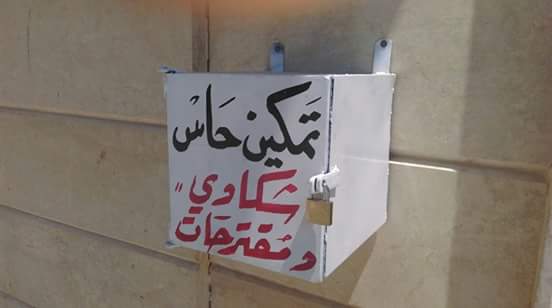Tamkeen Programme Supports Syrian Communities and Initiatives

Alya recently delivered her first child at the Maternity and Child Welfare centre in the town of Hass, in Syria’s Idlib province. All her care was absolutely free, which came as a great relief to the 22-year-old.
“Pregnant women are in desperate need of free healthcare,” Alya told Damascus Bureau. “These days most families live below the poverty line, and cannot afford to seek care at private hospitals.”
The Hass maternity centre is one of the many projects run by Tamkeen, funded by the European Commission and the UK Department for International Development. The programme supports local initiatives in liberated areas including the cities and wider countryside of Aleppo and Idlib, as well as Eastern Ghouta.
“Tamkeen is helping us solve many of the problems brought on by the conflict,” said Hass community leader Abu Mohammad. “Not only does it offer services free to civilians, it has also created various job opportunities for young men and women.”
Tamkeen focuses on health, education, infrastructure, good governance and economic recovery. Each of these five areas has the potential of becoming a revenue source for local councils, which in turn can allow them to implement further projects.
“So far we have inaugurated medical and maternity centres, education centres for children, and a centre for teaching sewing skills,” said Tamkeen field coordinator Mohammad al-Tawish.
“We have also offered support to local development projects such as bakeries, petrol stations, sewer repairs and rubbish disposal.”

A committee of 11 members administers Tamkeen projects. Al-Tawish was tasked with forming this committee, whose members were appointed in line with criteria set by programme funders.
“Each member is 30 years old or over and was nominated by a local council,” he said. “Most of them hold university degrees, vocational certificates, or are members of civil defence organisations or local CSOs [civil society organisations] who are highly regarded by the local community.”
Tamkeen’s committee cooperates with local councils to develop and implement a range of projects, prioritised according to urgency.
Each local region can apply for a grant to fund several projects. Each grant has a lifetime of six months, subject to renewal according to the importance and efficiency of the project.
“Each grant is divided into instalments of 5,000 dollars,” explained Tamkeen treasurer Usama Zeydan.
“Once this money has been spent, invoices and receipts are submitted to the committee which audits expenditures, then releases the next instalment.”
According to Zeydan, funds vary according to the size of the region. For instance, small neighbouring villages might receive a joint fund of 100,000 dollars, while large cities such as Aleppo receive 200,000 dollars.
A field coordinator and a financial coordinator supervise all stages of each project. If any financial corruption is detected, those implicated are prosecuted.
At the end of each six-month cycle, the performance of the Tamkeen committee is evaluated and grants are either increased or decreased accordingly. In Hass, for instance, the second cycle of its grant was increased to 117,000 dollars.
OVERCOMING GENDER BIAS
One of Tamkeen’s main objectives is to empower women within their local communities.
“We focus on advocating the role of women,” said committee member Khaled. “In Aleppo, for instance, women can become members of the main committee board.”
However, conservative traditions do not allow this in all Syrian cities. In Idlib, for example, social restrictions and the presence of Jabhat al-Nusra means that women do not run for committee membership. Instead, they take on different roles.
“Tamkeen formed a sub-committee of volunteer women in Idlib who participate in developing and implementing projects,” said Khaled. “Each member works with the project for six months, then a new sub-committee is appointed.”
The main task of this sub-committee is to monitor expenses for the duration of one six-month grant cycle.
Tamkeen’s projects also aim to provide women with employment opportunities. As well as awareness and cultural seminars, centres have been established where they can learn weaving, sewing and nursing skills.
“Tamkeen has enabled women to become active members of their communities,” said Khansa Shaban, a member of the Hass sub-committee.
“Those who volunteer as members of its sub-committee receive specialist project management training. This allows them to identify an appropriate action plan, and efficiently manage the grant they supervise.”
Towards the end of each grant cycle the performance of each member is evaluated. Those who receive high scores are given the opportunity to remain on the sub-committee for an additional six-month cycle.
“Tamkeen is a very flexible programme that aims to involves as many layers of society as possible,” said field coordinator al-Tawish.
“As long as there are active participants whose main concern is to ease some of the burdens Syrians are suffering, and as long as there are volunteers who are ready to lend a hand at no charge, the programme will continue running.”
Hadia Mansour is the pseudonym of a Damascus Bureau contributor from Idlib, Syria.
Read the Arabic version of this article here
